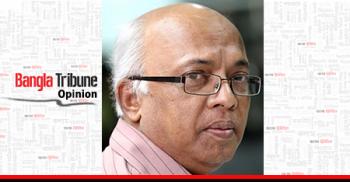 December has a resonance in the history of the Bengali nation. There is a poignancy which underpins it. There is a mix of poetry and politics which has come to accord it permanence in the history of this land.
December has a resonance in the history of the Bengali nation. There is a poignancy which underpins it. There is a mix of poetry and politics which has come to accord it permanence in the history of this land.
DECEMBER 1963
Travel back in time to December 1963.
It was surely a season of sadness for our people when Huseyn Shaheed Suhrawardy, in lonely exile away from his country --- and the country was pre-1971 Pakistan --- passed away in Beirut. The circumstances surrounding the death of the man who had played a prominent role in the politics of pre-partition Bengal and in post-1947 Pakistan have never been fully explained. There are of course memories of the dark warning held out by Zulfikar Ali Bhutto, at the time an Ayub Khan loyalist and foreign minister in the regime, and passed on to Suhrawardy that he must not dare set foot in Pakistan again. The warning came only weeks before the former prime minister of Bengal and then of Pakistan died in Beirut.
It is on the record too that Sheikh Mujibur Rahman, yet to be Bangabandhu and yet to lead East Pakistan to freedom as Bangladesh, in the years after 1963 and till his assassination twelve years later, did not accept Suhrawardy’s passing as a death happening in normal conditions. He suspected foul play and squarely pointed the finger at the Ayub regime. No inquiries were initiated by the regime and indeed it was given out that the death had been brought on by a cardiac arrest.
It was an entire Dhaka, indeed a whole province, which came to a halt once Suhrawardy’s remains arrived in the country a few days after the tragedy. Suhrawardy’s end was a grievous blow to the movement for a restoration of democracy in Pakistan, given that Shere Bangla AK Fazlul Huq had succumbed to old age ailments in April 1962 and Khwaja Nazimuddin, engaged in the campaign to elect Fatima Jinnah the president of Pakistan through having Ayub Khan defeated at the election of January 1965, would die in October 1964.
Suhrawardy’s death was to lead to new configurations in Pakistan’s politics, with the younger generation of politicians symbolized by Sheikh Mujibur Rahman taking charge of the Awami League and taking it out of the National Democratic Front that had been forged in 1962 to mount a collective challenge to the Ayub dispensation. The Awami League would chart a course that would accord to its politics a radical dimension leading to a revival of democratic struggle in Pakistan.
DECEMBER 1969
Six years later, on the anniversary of the death of Suhrawardy, Bangabandhu Sheikh Mujibur Rahman publicly made the declaration that henceforth the province of East Pakistan would be known as Bangladesh. He had political logic to support his argument. The One Unit system would soon be dispensed with in West Pakistan, with its four provinces once more being officially known as Punjab, Sind, Baluchistan and the North-West Frontier Province. If the provinces in the western part of the country could have their identities restored, he argued, it made little sense for Pakistan’s majority province not to call itself Bangladesh.
Note that in placing his arguments for Bangladesh, Bangabandhu did not speak of Bengal or East Bengal. He had reason not to, for Bengal as it once was had ceased to exist with the partition of 1947. What remained of the old Bengal was the Indian state of West Bengal and the Pakistani province of East Pakistan, which of course was known before the adoption of Pakistan’s 1956 constitution as East Bengal. Bangabandhu could have argued for a return to East Bengal. He chose not to, his sights clearly set on the new history he was already envisioning for his province. Bangladesh was more of a pragmatic proposition than any other. The idea of Bangladesh, as propounded by the future founder of the country on 5 December 1969, swiftly took hold of the Bengali imagination.
DECEMBER 1970
December 1970 was a defining year for Bengalis and for Pakistan as a whole. The results of the first general election in the country early in the month threw up a happy situation where the Awami League under Bangabandhu’s leadership obtained a clear mandate to govern the country in line with its Six Point programme of regional autonomy. It was expected that the Pakistan People’s Party, as the leading minority group in the national assembly, would play the role of an effective opposition once a constitution had been framed and a government had been formed by the Awami League in Islamabad.
Expectations were high in Bangladesh that the moment for Bengali rights to be achieved, indeed for Pakistan to be transformed into a democratic structure, with its federating units finally able to enjoy regional autonomy, had arrived. All preparations were in place for the first session of the national assembly in Dhaka, until the Yahya Khan regime and Z.A. Bhutto precipitated a crisis that would have grave repercussions for Pakistan and lead Bengalis into an epic struggle for freedom. Intrigue in distant Rawalpindi and Larkana would destroy Pakistan.
DECEMBER 1971
December 1971 would be the zenith of Bengali political attainments, for a multiplicity of reasons.
On 16 December, the very first Bengali republic in history emerged through the surrender of Pakistan’s armed forces at the end of a nine-month War of Liberation waged by 75 million Bengalis. The war had taken its toll, with three million people dying at the hands of the occupation army and 200,000 Bengali women raped by the soldiers.
On 22 December, the Father of the Nation, Bangabandhu Sheikh Mujibur Rahman, in solitary confinement in (West) Pakistan for the entire duration of the war, was removed from Mianwali prison and placed under house arrest in Sihala outside Rawalpindi.
On the same day, the provisional government of Bangladesh, led by Acting President Syed Nazrul Islam and Prime Minister Tajuddin Ahmad, arrived in Dhaka from exile and quickly went into the business of administering a country devastated by war.
Our December chronicles, as we recall them.
Do not forget, though, that there was another, earlier December, in 1906, when the All-India Muslim League was given shape and substance in Dhaka.
In December 1911, the British colonial administration annulled the partition of Bengal in response to massive protests generated by the partition of the province in 1905.
And in December 1990, a mass movement forced the dictatorial regime of General Hussein Muhammad Ershad from power here in this land.
Syed Badrul Ahsan is the author of biographies of Bangabandhu Sheikh Mujibur Rahman and Tajuddin Ahmad and writes on politics and diplomacy.


